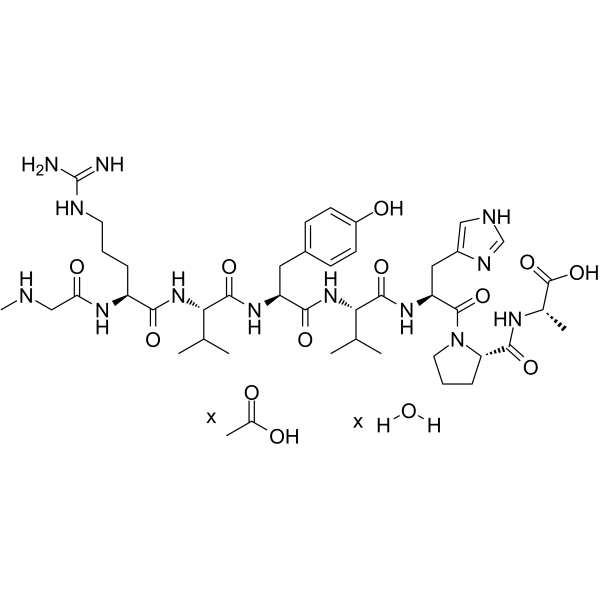| Description |
Saralasin ([Sar1,Ala8] Angiotensin II) acetate hydrate is an octapeptide analog of angiotensin II. Saralasin acetate hydrate is a competitive angiotensin II receptor antagonist with a Ki value of 0.32 nM for 74% of the binding sites, and has partial agonist activity as well. Saralasin acetate hydrate can be used for the research of renovascular hypertension, renin-dependent (angiotensinogenic) hypertension[1][3][6].
|
| Related Catalog |
|
| Target |
Ki: 0.32 nM (Angiotensin II receptor)[3]
|
| In Vitro |
Saralasin acetate hydrate (1 nM, 48 or 72 h) inhibits cell growth in 3T3 and SV3T3 cells[1]. Saralasin acetate hydrate (5 μM, 2h) restores Ito, fast (Fast-Inactivating Transient Outward K+ Current in Mouse Ventricle) and I K, slow (Slow-Inactivating Transient Outward K+ Current in Mouse Ventricl) to control levels in myocytes[2]. Saralasin acetate hydrate (0.1-10 nM, 40 min) inhibits binding of FITC-Ang II to rat liver membrane preparation (used as the source of angiotensin receptors) with a Ki value of 0.32 nM for 74% of the binding sites and 2.7 nM for the remaining binding sites[3]. Saralasin acetate hydrate (1 μM, perfused rat ovary in vitro) inhibits the ovulation rate versus control and reduces prostaglandin E2 and 6-keto-prostaglandin F1α levels[4]. Cell Proliferation Assay[1] Cell Line: 3T3 and SV3T3 cells Concentration: 1 nM Incubation Time: 48 h, 72 h Result: Inhibited cell growth in 3T3 and SV3T3 cells and caused an increase of cellular renin concentration.
|
| In Vivo |
Saralasin acetate hydrate (intravenous injection, 5-50 μg/kg, a single dose) ameliorates the oxidative stress and tissue injury in cerulein-induced pancreatitis[5]. Saralasin acetate hydrate (subcutaneous injection, 10 and 30 mg/kg, a single dose) increases serum renin activity (SRA) in normal, conscious rats, without markedly altering blood pressure or heart rate[6]. Animal Model: Cerulein-induced acute pancreatitis rats model[5] Dosage: 5, 10, 20, and 50 μg/kg, a single dose. Administration: Intravenous injection Result: Restored the pancreatic morphological characteristics to the control level. Reduced pancreatic injury and suppressed the glutathione depletion induced by cerulean. Animal Model: Male Sprague-Dawley rats[6] Dosage: 10 and 30 mg/kg, a single dose. Administration: Subcutaneous injection Result: Stimulated renin release without altering blood pressure or heart rate at the time of measuring serum renin levels 20 minutes after injection.
|
| References |
[1]. P Schelling, et al. Effects of angiotensin II and angiotensin II antagonist saralasin on cell growth and renin in 3T3 and SV3T3 cells. J Cell Physiol. 1979 Mar;98(3):503-13. [2]. Jeremy H Kim, et al. Pressure-overload-induced angiotensin-mediated early remodeling in mouse heart. PLoS One. 2017 May 2;12(5):e0176713. [3]. Maziar Mohammad Akhavan, et al. A non-radioactive method for angiotensin II receptor binding studies using the rat liver. J Pharmacol Toxicol Methods. 2006 May-Jun;53(3):206-14. [4]. M Mikuni, et al. Saralasin-induced inhibition of ovulation in the in vitro perfused rat ovary is not replicated by the angiotensin II type-2 receptor antagonist PD123319. Am J Obstet Gynecol. 1998 Jul;179(1):35-40. [5]. Siu Po Ip, et al. Saralasin, a nonspecific angiotensin II receptor antagonist, attenuates oxidative stress and tissue injury in cerulein-induced acute pancreatitis. Pancreas. 2003 Apr;26(3):224-9. 6/ [6]. Campbell WB, et al. Saralasin-induced renin release: its blockade by prostaglandin synthesis inhibitors in the conscious rat. Hypertension. 1979;1(6):637‐642.
|
